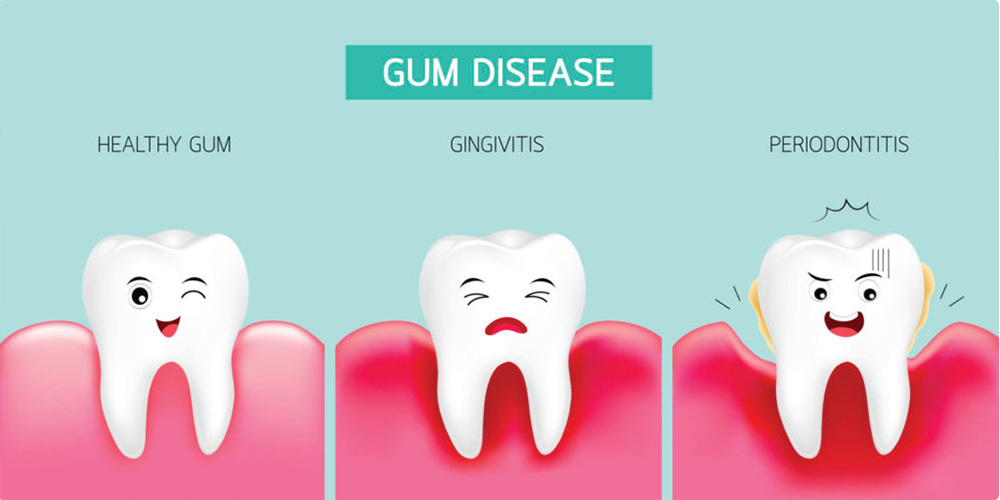If your gums bleed, are tender, sensitive, or swell up occasionally when you floss, you might have gingivitis. However, you’re not alone.
According to the Canadian Dental Hygienist Association, about half of the Canadian population has gingivitis, yet many are not completely aware.
How do I know if I have Gingivitis?
Healthy gums are pink in colour and quite firm in texture. Gums affected by Gingivitis on the other hand have the tendency to be red in colour, swollen, tender, non uniform and bleed easily especially when brushing or flossing, bad breath and receding gums are other signs.
Gingivitis is quite common. If properly addressed it can be easily treated; otherwise, it can advance into periodontitis, a more serious gum disease that can potentially lead to tooth loss due to its spreading throughout the deeper tooth supporting tissues and bones beneath your gums.
Periodontitis can go beyond your oral cavity!
New research indicates that periodontitis could have an impact on other health problems, including some cancers, Alzheimer’s disease, heart disease, and respiratory disease.
Who is more susceptible to developing Gingivitis?
The chances of developing Gingivitis increase with the following factors:
- Poor oral hygiene habits.
- Tobacco usage.
- Dry mouth.
- Poor nutrition.
- Vitamin C deficiency.
- Hormonal changes during pregnancy and cycles.
- Certain blood pressure and seizure medications.
- Crooked or overlapping teeth.
- Ill fitting or broken dental restorations.
- Conditions impacting your immunity like HIV/AIDS, chemotherapy and immunosuppressive medications.
- Genetics can play a major role as well.
Gingivitis is a very serious problem that should not be neglected!
How can I protect myself from Gingivitis?
As they say, an ounce of prevention is better than a pound of cure.
Luckily, there are various ways to prevent it from occurring:
- Maintaining good oral hygiene. This is the most effective way of preventing this disease. Brushing your teeth at least twice a day, once in the morning and once before bed. It would also be helpful to brush after every meal or snack. Flossing is especially important as it removes any remaining food particles and bacteria that brushing leaves behind.
- Follow proper health habits. Eating healthy isn’t only beneficial for your body, but it is also beneficial for your teeth. This is because when eating sugary or starchy foods, you feed the tooth decay and gum disease causing bacteria found in your mouth.
- Regular dentist visits. Regular checkups and cleanings go hand in hand with good oral hygiene. Most people need to get cleanings every 6 months, but if you are more susceptible to developing gum disease for example if you smoke, have braces or pregnant you will be advised to get cleanings more often.
How is Gingivitis Treated?
Treating gingivitis can sometimes be done at home, or might also need additional treatment at the dentist’s office, depending on the stage and extend of the gum disease.
It all starts by letting the dentist examine and diagnose your individual gums status.
Sometimes an antibacterial toothpaste and antibacterial mouthwash would be recommended by your dentist for you to use at home. They are capable of fighting plaque and bacteria even after you’re done brushing, especially in those hard to reach places. Additionally, your dentist may suggest more effective ways of brushing including the use of an electric toothbrush, paying special attention to the gum line when brushing, using a water-pick and so on.
In some cases you might need additional in clinic treatments to be done to control gingivitis like:
- Antibiotic gel. After a deep cleaning, this gel is spread around the gum lines and in gum pockets to help control the active infection.
- Deep gum cleaning. Instruments that perform a deep cleaning under the gum line are used.
- Surgical open flap cleaning. especially for areas with very deep pockets.
- Prescription of an antimicrobial mouthwash. A prescribed mouthwash that is more effective at fighting bacteria than regular mouthwash.
Gingivitis shouldn’t be something that you have to worry about now that you know how to avoid it and treat it. Brush your teeth, floss, use a mouth wash, and go for regular dental checkups and cleanings, and you should be good to go!
